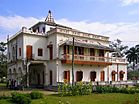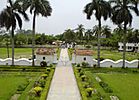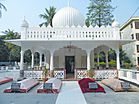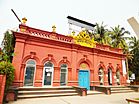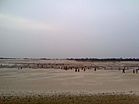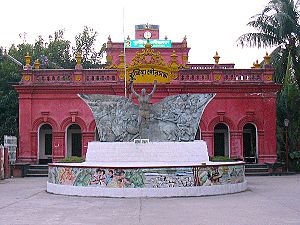Kushtia District facts for kids
Quick facts for kids
Kushtia
|
|
|---|---|
|
From top: Hardinge Bridge, Shilaidaha Kuthi Bari – residence of Rabindranath Tagore , Tomb of Lalon Fakir, Kushtia Municipality, Jhaudia Shahi Mosque, Gorai River and Palki monument
|
|
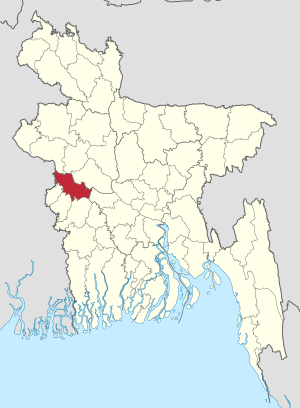
Location of Kushtia in Bangladesh
|
|
| Country | |
| Division | Khulna Division |
| Area | |
| • Total | 1,608.80 km2 (621.16 sq mi) |
Kushtia is a district located in the Khulna administrative division of western Bangladesh. A district is like a large region or area within a country.
Kushtia became its own separate district after the partition of India in 1947. Before that, it was part of a larger area called Nadia District under British rule.
The Kushtia District covers an area of about 1608.80 square kilometres. It shares borders with several other districts. To the north, you'll find Rajshahi, Natore, and Pabna. To the south are Chuadanga and Jhenaidah. Rajbari District is to the east, and to the west, it borders West Bengal (a state in India) and Meherpur District.
Contents
Exploring Kushtia: Fun Places to Visit
Kushtia has some interesting places to explore, especially if you like history and culture.
Shilaidaha Kuthibari: A Poet's Home
The Shilaidah Kuthibari is an old family mansion that belonged to the Tagore Zamindari. A "Zamindari" was like a large estate owned by a powerful family. This beautiful house is in Shilaidaha, which is part of the Kumarkhali Upazila in Kushtia. It's only about 20 kilometres from Kushtia town.
The famous poet Rabindranath Tagore lived here for some time. He wrote many of his well-known poems while staying at the Kuthibari. Today, the Kuthibari is a museum. The Archaeological Department of Bangladesh takes care of it, so visitors can learn about its history.
Lalon Fakir's Shrine: A Place of Music and Faith
Another important place to visit is the shrine of Lalon Fakir. He was the founder of the Baoul faith, which is a special kind of folk music and spiritual tradition in Bangladesh. His shrine is located in Cheouria, about 2 kilometres from the Kushtia railway station. Many people visit this place to honor Lalon Fakir and learn about his teachings.
Kushtia's Economy: How People Make a Living
The economy of Kushtia relies on both farming and industries.
Farming and Soil
Historically, Kushtia had very fertile soil, meaning it was great for growing crops. However, during the time of British rule, a plant called Indigo was grown a lot in this area. Growing indigo can make the soil less rich over time. Because of this, some parts of the region now have poorer soil.
Key Industries: Jute and Rice
One of the biggest industries in Kushtia is related to Jute. Jute is a long, soft, shiny plant fiber that can be spun into coarse, strong threads. The local name for jute is "Kushti," which is actually where the name of the district, Kushtia, comes from!
There are also many rice mills in the area. A rice mill is a factory where rice is processed after it's harvested.
Industrial Growth
Kushtia is home to various types of industries. These include factories that work with jute, metal, tobacco, sugar, textiles (making cloth), wood, and rice.
Many large factories are located in the BSCIC industrial area in Kushtia Sadar Upazila. "BSCIC" stands for Bangladesh Small and Cottage Industries Corporation. This area helps new businesses grow.
Kumarkhali Upazila is a major center for textiles in Kushtia district. Many textile and fabric industries have set up their businesses in the Kumarkhali BSCIC area.
Kushtia is also famous for its rice production. In the Khazanagar area, there are about 400 rice mills, which is the highest number in the entire country! About 70% of all the processed rice supplied from that area goes to different parts of Bangladesh.
See also
 In Spanish: Kushtia (zila) para niños
In Spanish: Kushtia (zila) para niños



